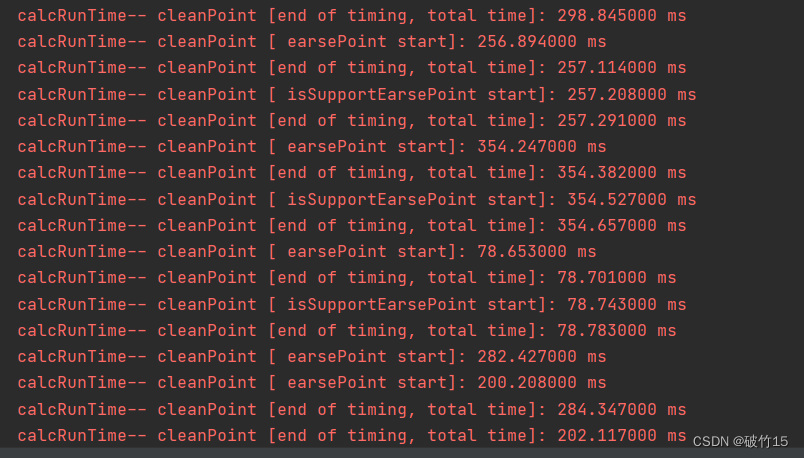方式1
#define VA_ARGS_TO_STRING(...) DrawUnitDebug::vaArgsToString(__VA_ARGS__)
#ifdef DRAW_UNIT_DEBUG
//计时开始
#define TIMING_START(...) static auto time_point_start = std::chrono::steady_clock::now();\
static auto time_point_end = std::chrono::steady_clock::now(); \
static std::chrono::duration<double, std::milli>period_spend_time=time_point_end - time_point_start ;\
time_point_end = std::chrono::steady_clock::now(); \
period_spend_time = time_point_end - time_point_start;\
ALOGE("\n start use time outside :%lf : %s",period_spend_time.count(),VA_ARGS_TO_STRING(__VA_ARGS__).c_str());\
time_point_start = std::chrono::steady_clock::now();
//计时结束
#define TIMING_END(...) time_point_end = std::chrono::steady_clock::now();\
period_spend_time = time_point_end - time_point_start;\
time_point_start = std::chrono::steady_clock::now();\
ALOGE("\n end time:%lf : %s", period_spend_time.count(),VA_ARGS_TO_STRING(__VA_ARGS__).c_str());\
#else
#define TIMING_START //
#define TIMING_END //
#endif
//
std::string DrawUnitDebug::vaArgsToString(const char *msg, ...){
char* contentMsg;
va_list vaList;
va_start(vaList, msg);
vasprintf(&contentMsg, msg, vaList);
va_end(vaList);
return std::string(contentMsg);
}
方式2
class calcRunTime{
public:
calcRunTime(std::string t){
tag=t;
startTime = clock();
lastTime = clock();
}
void printTime(std::string t,std::string msg){
tag=t;
clock_t now_time=clock();
#ifdef ANDROID
double tim=(double)(now_time - lastTime)/ 1000.0;
if(tim>20)
ALOGE(" calcRunTime-- %s [%s]: %lf ms",t.c_str(),msg.c_str(),tim);
#else
printf(" calcRunTime-- %s [%s]: %lf ms",t.c_str(),msg.c_str(),(double)(now_time - lastTime)/ 1000.0);
#endif
lastTime = clock();
}
void restart(std::string t){
tag=t;
startTime=clock();
}
void setTag(std::string t){
tag=t;
}
~calcRunTime(){
lastTime=startTime;
printTime(tag,"end of timing, total time");
}
void calcTime(){//test
std::chrono::steady_clock::time_point start= std::chrono::steady_clock::now();
std::chrono::steady_clock::time_point now = std::chrono::steady_clock::now();
float m_drawFrameTime = std::chrono::duration_cast<std::chrono::microseconds>(now - start).count() / 1000.0f;
}
static calcRunTime* static_ctr_p;
private:
std::string tag="";
clock_t startTime,endTime,lastTime;
};
//方式一: 需要在同一个语句块成对出现,多线程(推荐)
#define CALC_TIME_START(index) {calcRunTime crt##index(__FUNCTION__);
#define CALC_TIME_SPAN(index,msg) crt##index.printTime(__FUNCTION__,msg);
#define CALC_TIME_RESET(index) crt##index.restart(__FUNCTION__);
#define CALC_TIME_END(index) crt##index.setTag(__FUNCTION__);}
//方式2: 跨程序块执行,跨线程全局变量需要做维护,多线程算了
#define CALC_TIME_START1(crt_ptr) crt_ptr=new calcRunTime(__FUNCTION__);
#define CALC_TIME_SPAN1(msg,crt_ptr) crt_ptr->printTime(__FUNCTION__,msg);
#define CALC_TIME_RESET1 crt_ptr->restart(__FUNCTION__);
#define CALC_TIME_END1(crt_ptr) crt_ptr->setTag(__FUNCTION__);delete crt_ptr;
//方式3: 任意地方使用,多线程算了
#define CALC_TIME_START2 if(calcRunTime::static_ctr_p== nullptr)calcRunTime::static_ctr_p=new calcRunTime(__FUNCTION__);
#define CALC_TIME_SPAN2(msg) calcRunTime::static_ctr_p->printTime(__FUNCTION__,msg);
#define CALC_TIME_RESET2 calcRunTime::static_ctr_p->restart(__FUNCTION__);
#define CALC_TIME_END2 calcRunTime::static_ctr_p->setTag(__FUNCTION__);delete calcRunTime::static_ctr_p; calcRunTime::static_ctr_p=nullptr;
使用:
//方式1
{
CALC_TIME_START(0);
...
CALC_TIME_SPAN(0,"test1")
...
CALC_TIME_END(0)
}
//方式2
calcRunTime* ctr_p;
CALC_TIME_START1(ctr_p);
{
...
CALC_TIME_SPAN1("test2",ctr_p)
...
CALC_TIME_END1(ctr_p)
}
//方式3
calcRunTime* calcRunTime::static_ctr_p= nullptr;
//任意位置
CALC_TIME_START2
CALC_TIME_SPAN2("test3")
CALC_TIME_END2
结果


























 691
691

 被折叠的 条评论
为什么被折叠?
被折叠的 条评论
为什么被折叠?








